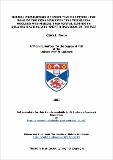Neural mechanisms of executive function : the role of the pedunculopontine tegmental nucleus and medial prefrontal cortex in delayed spatial win-shift behaviour in the rat
Abstract
The pedunculopontine tegmental nucleus (PPTg) has been argued to be involved in mediating neural processing relating to executive functions (Winn, 1998). Since it
shares connections with fronto-striatal circuitry this proposal is not surprising. However, research examining the functions of structures within this system has frequently ignored the contribution of PPTg. The delayed spatial win-shift (DSWS)
task is a task that measures spatial working memory and, as such, has been used by
Phillips and colleagues to reveal the involvement of ventral striatal structures in this
form of "executive" behaviour. This suggests that structures interconnected with PFC share in some way frontal functions. As might be expected from its connections, the
involvement of PPTg in the same task has also been demonstrated (Keating & Winn,
2001). The current research was designed to assess further the involvement of PPTg in the DSWS task, and to compare this directly to the involvement of prefrontal cortex (PFC). In order to achieve this, rats with excitotoxic lesions of PPTg and medial PFC were assessed on the DSWS task, in addition to rats with crossed unilateral disconnection of medial PFC/PPTg. Statistically, results demonstrated both PPTg and medial PFC lesions produced similar impairments in the test phase of DSWS, characterised by increased errors, earlier error occurrence, and slower latencies. In contrast, disconnection lesions of medial PFC/PPTg produced an impairment that was fundamentally different. It was concluded that while this supports the importance of PPTg functioning within fronto-striatal systems, the pattern of impairment shown by disconnected rats suggested that this function
may not be executive per se but might be necessary for executive functions to influence behaviour.
Type
Thesis, PhD Doctor of Philosophy
Collections
Items in the St Andrews Research Repository are protected by copyright, with all rights reserved, unless otherwise indicated.

